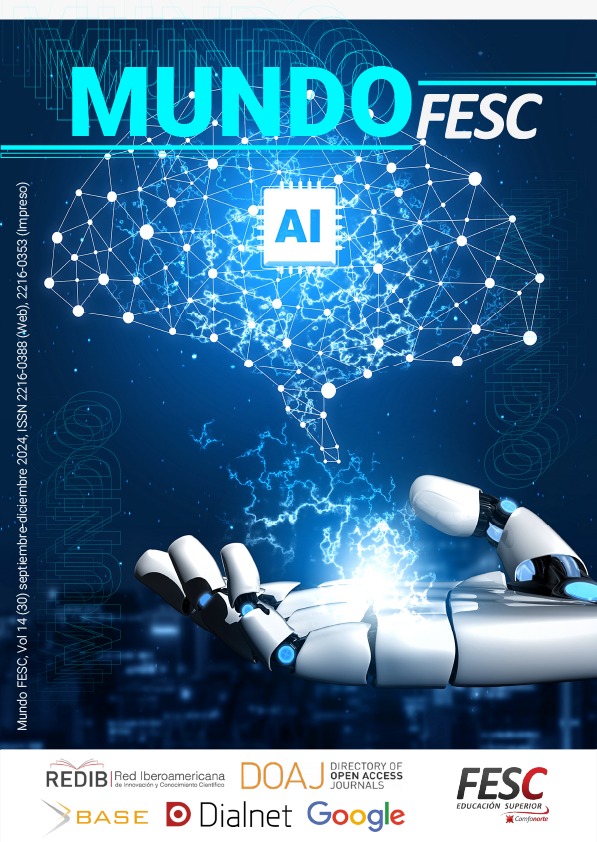Obstáculos y Barreras de los Docentes en la Integración de TIC y sus Repercusiones en el Contexto postpandemia
DOI:
https://doi.org/10.61799/2216-0388.1541Palabras clave:
TIC, formación del profesorado;, Instituciones educativas, brecha digital, políticas educativasResumen
Este estudio investiga las barreras y limitaciones que los docentes enfrentan al integrar las tecnologías de la información y comunicación (TIC) en la educación, utilizando un enfoque cualitativo basado en entrevistas semi-estructuradas con docentes de diversas regiones de Colombia. Los resultados revelan desafíos críticos, como la insuficiencia de infraestructura tecnológica, la falta de formación docente y las desigualdades socioeconómicas que limitan el acceso a la tecnología. Estos obstáculos no solo afectan la calidad de la enseñanza, sino que también perpetúan las desigualdades educativas, especialmente en comunidades vulnerables. El estudio ofrece recomendaciones para abordar estos problemas, enfatizando la importancia de desarrollar políticas educativas inclusivas y proporcionar capacitación continua a los docentes. Estas medidas son esenciales para garantizar que las TIC se utilicen de manera efectiva para mejorar los resultados educativos y cerrar la brecha digital en el contexto actual de rápida transformación tecnológica
Descargas
Referencias
[1] N. Selwyn. Education and technology: Key issues and debates. London: Bloomsbury Academic, 2017. DOI: https://doi.org/10.5040/9781474235952
[2] D. Laurillard. Teaching as a design science: Building pedagogical patterns for learning and Technology. Londom: Routledge, 2012.
[3] Organización de las Naciones Unidas para la Educación, la Ciencia y la Cultura. Education for Sustainable Development Goals: learning Objectives. France: UNESCO.
[4] S. Acrretero, R. Vuorikari, Y. Punie. DigComp 2.1: The Digital Competence Framework for Citizens with eight proficiency levels and examples of use. Luxembourg: Publications Office of the European Union, 2017.
[5] M. Warschauer, T. Matuchniak, “New technology and digital worlds: Analyzing evidence of equity in access, use, and outcomes”, Review of Research in Education vol. 34, no. 1, pp. 179-225, march 2010. DOI: https://doi.org/10.3102/0091732X09349791
[6] P. A. Kirchne, M. Selinger, “The State of Affairs of Teacher Education with Respect to Information and Communications Technology”, Technology, Pedagogy and Education,
vol. 12, pp. 5-17, february 2003.
[7] J. Voogt, N. P. Roblin, “A comparative analysis of international frameworks for 21stcentury competences: Implications for national curriculum policies”, Journal of Curriculum Studies, vol. 44, no. 3, pp. 299-321, april 2012. DOI: https://doi.org/10.1080/00220272.2012.668938
[8] Ministerio de Educación Nacional. Competencias TIC para el desarrollo profesional docente, Bogotá: Mineducación 2013.
[9] J. D. Hernández, M. D. Ramírez, Z. López, “Experiencia comunitaria cocreativa en la producción de relatos audiovisuales. Una perspectiva de jóvenes víctimas en Norte de Santander, desde la investigación-acción”, Kepes, vol. 19, no. 25, pp. 15-45, enero2022. DOI: https://doi.org/10.17151/kepes.2022.19.25.2
[10] J. Van Dijk. The digital divide. Cambridge, UK: Polity, 2020.
[11] P. A. Ertmer, A. T. Ottenbreit-Leftwich, O. Sadik, E. Sendurur, P. Sendurur, Teacher beliefs and technology integration practices: A critical relationship”, Computers & Education, vol. 59, no. 2, pp. 423-435, september 2012. DOI: https://doi.org/10.1016/j.compedu.2012.02.001
[12] M. Fullan. Stratosphere: Integrating technology, pedagogy, and change knowledge. Toronto: Pearson, 2013.
[13]R. E. Clark, R. E. Mayer.E-Learning and the Science of Instruction: Proven Guidelines for Consumers and Designers of Multimedia Learning. Reino Unido: John Wiley & Sons., 2016. DOI: https://doi.org/10.1002/9781119239086
[14] M. J. Koehler, P. Mishra, “What is technological pedagogical content knowledge (TPACK)?” Contemporary Issues in Technology and Teacher Education, vol. 9, no. 1,pp. 60–70, march 2009.
[15] J. A. C. Hattie. Visible learning. A synthesis of over 800 meta analyses relating to achievement. London: Routledge, 2009.
[16] S. Livingstone, “Critical reflections on the benefits of ICT in education”, Oxford Review of Education, vol. 38, no. 1, pp. 9-24, june 2012. DOI: https://doi.org/10.1080/03054985.2011.577938
[17]V. Braun, V. Clarke, “Using thematic analysis in psychology”, Qualitative Research in Psychology, vol. 3, no. 2, pp. 77-101. DOI: https://doi.org/10.1191/1478088706qp063oa
[18] G. Sunkel, D. trucco, A. Espejo. La integración de las tecnologías digitales en las escuelas de América Latina y el Caribe Una mirada multidimensional. Santiagod e Chile: Naciones Unidas, 2013.
[19] M. Prensky. From digital natives to digital wisdom: Hopeful essays for 21st century learning. California: Corwin Press, 2012. DOI: https://doi.org/10.4135/9781483387765
[20] J. S. Brown. Learning in the digital age. In: M. Devlin, R. Larson, J. Meyerson (Eds.), The Internet and the university: 2001 forum (pp. 65-91). Boulder, CO: EDUCAUSE Publications, 2002.
Descargas
Publicado
Número
Sección
Licencia
Derechos de autor 2024 Mundo FESC

Esta obra está bajo una licencia internacional Creative Commons Atribución-NoComercial 4.0.






